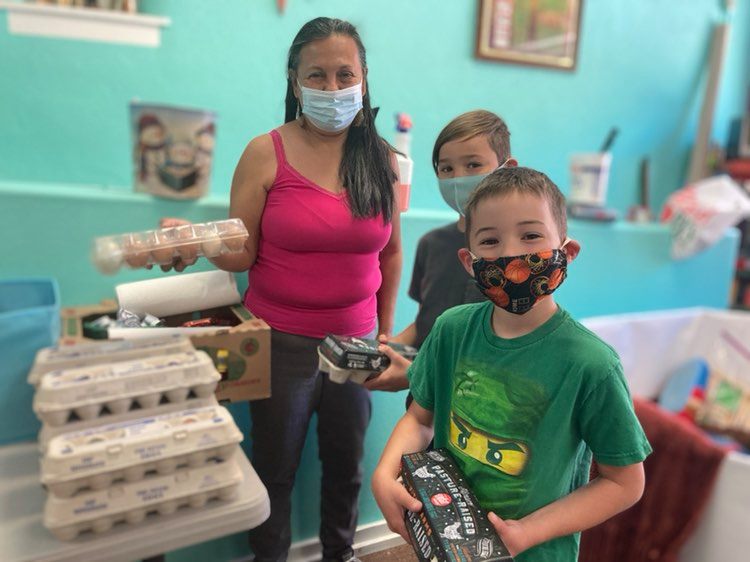
Lupe Salazar receives farm fresh eggs from Feliz and Alonso for her food pantry. Ashley Roux Trujillo
When Ashley Roux Trujillo, a farmer in the small village of Chimayo, New Mexico, was driving home on a spring day this year, she was puzzled by a long line of cars backed up onto the country highway.
As she drove past, she recognized some of her neighbors, and as she kept driving she realized the cars were lined up for Barrios Unidos, a nonprofit that was distributing food to low-income people. The realization that her neighbors were relying on a food pantry brought tears to her eyes.
Her own family farm, El Rincon, had been hit hard over the years by the historic drought in New Mexico, so they had to give up many of their crops and livestock. Ashley was now focused on selling farm-fresh eggs, teaching her two young sons how to raise the chickens.
“I wish I could donate my eggs to the Barrios Unidos food pantry,” she thought as she pulled up to her farm. But she knew this wasn’t economically feasible for her family.
Later that week, Ashley spoke with another Chimayo farmer, Serafina Lombardi, who was also raising chickens. Serafina instantly thought of AFSC’s Farm to Food Bank program and encouraged Ashley to contact me.
At first, Ashley said she felt bad for even asking AFSC to help. But I told her this is exactly what the Farm to Food Bank program is meant for. Through generous donations from individuals as well as funding through the county, AFSC can pay farmers a fair price for their food to help them stay economically afloat during the pandemic.
We then get the food to where it’s most needed—the food pantries and food banks responding to a surge in need. New Mexico’s unemployment rate is second worst in the nation, so more families are needing to rely on assistance to eat.
Supporting Abuelita’s Circle
Ashley then contacted Lupe Salazar, the grandmother running Barrios Unidos food pantry, to see if she could use farm-fresh, organic eggs. “Ashley, how amazing!” Lupe said. “We get so may folks needing a bit of support!” Lupe explained that she had organized “Abuelita’s Circle,” a group of grandmothers raising their grandchildren and in need of food boxes. The “abuelitas” love farm-fresh eggs.
So Serafina, Ashley and her children are now delivering their eggs to Barrios Unidos while being paid by AFSC. “I love taking the boys with me to Barrios Unidos, and we may start volunteering there," Ashley said.
Serafina added, “I like wholesale markets better than trying to sell all of my eggs to individuals, which means more contact with people coming onto my farm or having to make deliveries. And I love that my eggs are going to the Abuelita’s Circle! This collaboration is exactly how I want to participate in the food system!“
Over a year and a half ago when AFSC started Farm to Food Bank, we didn’t know how long the pandemic would last and didn’t imagine the need would still exist in the spring of 2021. Since the program began, AFSC has supported 30 small scale New Mexico family farms with purchases of almost 20,000 pounds of produce. That produce has gone directly to local food pantries and shelters that reach over 70,000 clients.
AFSC has also been invited to present our work as a “proof of concept” to a public health conference; a statewide, bipartisan thinktank which works on state policy; and a local association of “anchor institutions” which procure local food.
Perhaps the Farm to Food Bank model could be another important shift in our food system, moving subsidies away from soy and crops for animal feed and toward small family farmers who can feed those who need it.